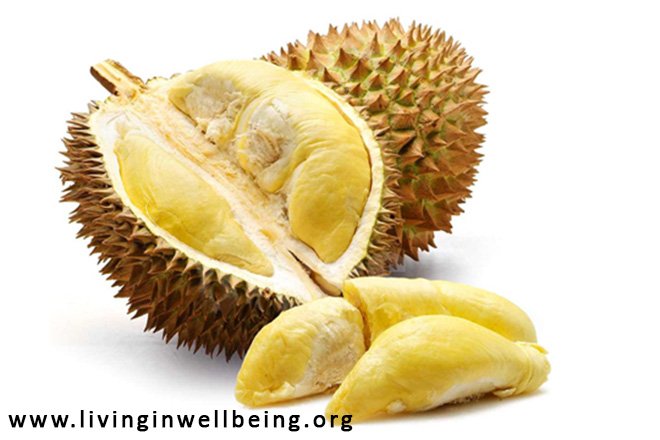
Eating healthy becomes a reality when you choose to eat fruits like Durian, as it is rich with vitamins and minerals. Durian is a tropical fruit known for its unique odor and good taste. It's named, "King of Fruits" in many South-East Asian countries. Exotic Durian is found in Brunei, Indonesia, and Malaysian rainforests. It starts bearing fruit after four or five years of the plantation. It's a seasonal fruit available from June to August.
It's large in size with a thorn-covered greenish brown husk. Its fleshy features are creamy-yellow to saffron in color. Its fleshy pulp is used for flavoring and can be eaten at various levels of ripeness. Durian seeds are small round or oval kernels that can be boiled for eating purposes.
The flesh of the fruit or its pulp is eaten during different stages of ripeness. It is also used as an agent for flavoring in lot many sweet dishes in the South East Asian cuisines. The seeds of the durian fruit can also be consumed, but only after boiling. It looks just like the seeds of jackfruit. The seeds have a taste that is bland, just like the jackfruit seeds.
How is it fruitful for our body?
Durian is rich in energy providing minerals, and vitamins. It is made of soft and easily digestible sucrose and fructose sugar instantly energize the body. It's free from saturated fats and cholesterol.
Durian contains high amount of dietary fiber, which makes it a bulk laxative. It protects the colon, mucous membrane by reducing exposure time to toxins. It also helps in eliminating cancer-causing chemicals from the gut.
It's a good source of Vitamin-C that helps to develop resistance against infections and harmful radicals. It's an excellent source of B-complex vitamins that are beneficial for health. Niacin, riboflavin, pantothenic acid (vitamin B5), pyridoxine (vitamin B-6) and thiamin (vitamin B-1) are found in it.
It also contains good amounts of manganese, potassium, copper, iron and magnesium. Manganese is a co-factor for antioxidant enzymes and superoxide dismutase. Copper and Iron are essential for RBCs. Potassium is an electrolyte present inside cells and body fluids. It helps to control heart rate and blood pressure.
How to store Durian?
The storage process
Although, it's sold in markets all round the world, some people may like slightly ripen durians, some may prefer tart flavored durians and others may like to have cherish, soft, and over-ripened ones. When the fruit is ripe, it falls off on its own and the fruit is gathered and sold in markets. In stores, one should choose the durian fruit that has a rigid stalk.
At places where it's not usually grown, it is very expensive. Varieties of durian like a Sultan (D24) are in great demand. It should be stored in refrigerator.
The durian fruit is covered with pointed spikes that are capable of inflicting cuts, which means one should be careful while dealing with it. It should be opened longitudinally like jackfruit to get its creamy yellow pulp, which should, in turn, be sliced to remove seeds.
How to serve the fruit?
Durian fruit is used for sweetening purposes in traditional Malay candy, ice kachang, dodol, biscuits, etc. It's used to prepare ice-cream, milkshakes and cappuccino.
In Malaysia and Indonesia, Durian is traditionally used to make a fermented paste condiment which is used to make a variety of dishes. Dishes like Ikanbrengkes i.e., fish cooked in durian sauce, is traditional in Sumatran islands of Indonesia. Unripe durians are used as a vegetable for cooking a variety of dishes. Durian seeds can be boiled or roasted for eating.
Healthy living diet choices include the right kind of food that we eat. Pick durians and other similar tropical fruits for maintaining your health and start living an energetic life!!












